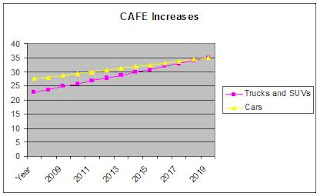CAFE Standards in the Senate
Despite an up and down week on the floor of the Senate, a new standard on fuel economy may have been set by the Senate. The Senate ended deb...
https://iskablogs.blogspot.com/2007/06/cafe-standards-in-senate.html
 Despite an up and down week on the floor of the Senate, a new standard on fuel economy may have been set by the Senate.
Despite an up and down week on the floor of the Senate, a new standard on fuel economy may have been set by the Senate. The Senate ended debate (62-32) and approved the energy bill (65-27) sometime around midnight on the 21st. The bill sets a new combined fuel economy average of 35 mpg by 2020 for fleet-wide sales. It also closes the gap between trucks (and SUVs) and cars by combining the mpg standard which currently stands at 27.5 mpg for cars and 22.2 mpg for SUVs and small trucks..
"It closes the SUV loophole," declared Sen. Dianne Feinstein, D-Calif. "This is a victory for the American public."
Regulators could void the 35 mpg standard in 2020 if there is “clear and convincing evidence” that it is not cost-effective, Feinstein said.
The energy bill also requires automakers make half of their vehicles capable of running on 85 percent ethanol by 2015.
Automakers were clearly not the winners in this debate, but they did not lose on everything. One requirement, which would have increased the CAFE standards 4 percent each year after 2020 for the next decade was removed. Automakers had pointed out that would mean they would have to make vehicles with fleet-wide average of 52 mpg by 2030.
Also, the $32 billion package of tax incentives on alternative fuels and new tax credits on plug-in hybrid vehicles were also removed. The tax incentives would have been payed, in part, by a $29 billion dollar tax on oil companies over the next ten years.
The $700 million in tax credits for plug-in hybrids would have gone to those who converted their hybrids into plug-ins or those who bought new vehicles.
The Auto Alliance has clearly not given up hope on blocking the legislation as it moves on to the House of Representatives.
President Bush is also said to be against the new standards. He would prefer more power be given to the Dept of Transportation and that no specific mileage numbers be set.
Read more about the bill passing: AutoNews (reg require), AP at Yahoo, and CNN.




